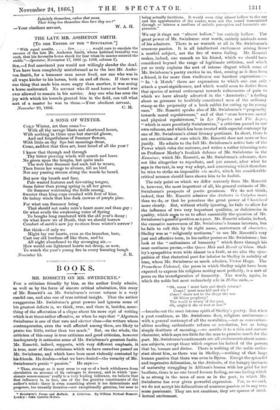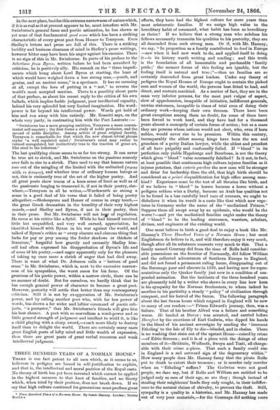BOOKS.
MR. ROSSETTI ON MR. SWINBURNE.*
Fon a criticism friendly by bias, as the author freely admits, as well as by the force of sincere critical admiration, this essay of Mr. Rossetti's on Mr. Swinburne's recent volume is a very candid one, and also one of true critical insight. That the author exaggerates Mr. Swinburue's great powers and ignores some of his greatest defects is, we think, true, and there is, besides, some- thing of the affectation of a clique about his mere style of writing which is at times rather offensive, as when he says that " Algernon Swinburne is one of that rare and electest class—the writers whom contemporaries, even the well affected among them, are likely to praise too little, rather than too much." Bat, on the whole, the criticism of this essay is true criticism and good criticism, however inadequately it estimates some of Mr. Swinburne's greatest faults. Mr. Rossetti, indeed, supports, with very different emphasis, it is true, most of those criticisms which we have ourselves passed on Mr. Swinburne, and which have been most violently contested by his friends. He doubts—what we have denied—the veracity of Mr. Swinburne's poetic " passion." He says:— "Thus, strange as it may seem to say so of a book withdrawn from circulation on account of its outrages to decency, and in which 'pas- sionate sensuousness' really is a very leading influence, we believe that that influence is, in fact, one of the less genuine constituents of the author's mind: there is even something about it too determinate and prepense, too uneasily iterative—not exceptionally genuine, but near to • Stotaburne's Poems and Ballads. A Criticism. By William Michael Rossetti. London : John Camden Rotten. being actually factitious. It would oven ring almost hollow to the oar and the apprehension of the reader, were not the sound transmitted through so intense a medium of artistic perception and harmonic ex- pression."
We say it rings not "almost hollow," but entirely hollow. The great power of Mr. Swinburne over words, entirely misleads some of his admirers. There is no warmth at all in Mr. Swinburne's sensuous passion. It is all intellectual excitement arising from • a morbid subject, not the fire of warm feeling. Mr. Rossetti makes, indeed, one remark on his friend, which we should have considered beyond the range of legitimate criticism, and which yet so truly explains the sort of intense disgust which some of Mr. Swinburne's poetry excites in us, that, coming as it does from a friend, it far more than vindicates our harshest expressions :- " In A Match' there are expressions to which one can only attach a quasi-significance, and which would seem to derive from
that species of sexual enticement towards refinements of pain to which we have already adverted in the Anactoria-; ' a feeling about as germane to healthily constituted men of the ordinary stamp as the propensity of a buck rabbit for eating up its young ones." Mr. Rossetti speaks also of Mr. Swinburne's " propensity towards moral repulsiveness," and of that " cross between moral and physical repulsiveness," in Les Noyades and The Leper, " which is more peculiarly Swinburnian," a criticism passed in our own columns, and which has been treated with especial contempt by one of Mr. Swinburne's ablest literary partizans. In short, there is not one criticism of ours which Mr. Rossetti does not more or loss justify. He admits to the full Mr. Swinburne's active hate of the Power which rules the universe, and writes a rather trimming note on Professor Morley's freakish defence of Mr. Swiuburne in the Examiner, which Mr. Rossetti, as Mr. Swinburne's advocate, does not like altogether to repudiate, and yet cannot, after what he says in the text, in any way adopt, and concerning which therefore he tries to strike an impossible via media, which his considerable critical acumen should have shown him to be foolish.
The only point on which we differ seriously from Mr. Rossetti is, however, the most important of all, his general estimate of Mr. Swinburne's prospects of poetic greatness. We do not think, indeed, that Mr. Rossetti admires the Atalanta in Calydou more than we do, or that he perceives the great power of t'hastelard more clearly. But, without wholly ignoring, he fails to allow for the influence of two very important qualities, or deficiencies in quality, which seri to us to affect essentially the question of Mr. Swinburne's general position as a poet. Mr. Rossetti admits, indeed, the excessive narrowness of Mr. Swinburne's human interests, but he fails to call this by its right name, narrowness of character. Shelley was as " religiously mutinous," to use Mr. Rossetti's very just and effective term, in his earlier poems as Mr. Swinburne ; but look at the "enthusiasm of humanity" which flows through his most mutinous poems,—the Queen Mab and Revolt of Islam. Shel- ley's sympathies were wide almost to a fault, as are also the sym- pathies of that rhetorical poet far inferior to Shelley in nobility of tone, whom Mr. Swinburne so much admires, Victor Hugo. The Prometheus Unbound, the poem in which Shelley might have been expected to express his religious mutiny most perfectly, is a sort of poem on the transfiguration of humanity. The words, again, in which the noble but most melancholy ode in Hellas ends,—
"Oh, cease ! must hate and death return?
Cease ! must men kill and die ? Cease! drain not to the dregs the urn Of bitter prophecy !
The world is weary of the past, Oh, might it die or rest at last !"
—breathe out the most intense spirit of Shelley's poetry. But when a poet combines, as Mr. Swinburne does, religious mutinousness with a general contempt of all the moralities,—not as convention- alities needing enthusiastic reform or revolution, but as being simply destitute of meaning,—we ascribe it to a thin and narrow character, which says too little for the man to promise much for the poet. Mr. Swinburne's excitements are all excitements about sensu- ous subjects, except those which express his hatred of the powers that be, human and divine. There is nothing of the noble enthu- siast about him, as there was in Shelley,—nothing of that large human passion that there was even in Byron. Except the splendid and impressive delineation, in the Atalanta, of the hungry instincts of maternity struggling in Althaea's bosom with her grief for her brothers, there is no one broad human feeling, no one feeling which is as strong in the mass of men as in the poet, to which Mr. Swinburne has ever given powerful expression. For, as we said, we do not accept his delineations of sensuous passion as in any true sense passionate. They are not emotions, they are spasms of intel- • lectual excitement.
In the next place, besides this extreme narrowness of nature which, if it is as real as it at present appears to be, must interfere with Mr. Swinburne's general fame and poetic estimation, he has shown as yet none of that fundamental good sense which has been a striking characteristic of every great poet from Homer to Tennyson. Even Shelley's letters and prose are full of this. There is a striking lucidity and business clearness of mind in Shelley's prose writings, however bitter may have been his anger against his enemies. There is no sign of this in Mr. Swinburne. In parts of his preface to the Selections from Byron, written before he had been assaulted by criticism, he is positively silly. His remark on the " three impedi- ments which hung about Lord Byron at starting, the least of which would have weighed down a less strong man,—youth, and genius, and an ancient name," is a specimen. It has no meaning at all, except the love of putting in a " not," to reverse the world's most accepted maxims. There is a puerility about parts of that preface, as about his recent reply to the critics of his own .ballads, which implies feeble judgment, poor intellectual capacity, behind his very splendid but very limited imagination. His word- power is far beyond his intellectual power. Words get hold of him and run away with him entirely. Mr. Rossetti says, on the whole very justly, in contrasting him with the Poet Laureate :— " Swinburne has a more grasping ambition, Tennyson a more concen- trated self-mastery ; the first forms a study of noble profusion, and the second of noble discipline. Among artists of great original faculty, Tennyson is remarkable for that which the now almost trivial phrase styles a well regulated mind ;' Swinburne's mind may rather bo termed unregulated, but instinctively true to the traction of great art, like steel to the lodestone."
The last qualifying clause seems to us far too strong. It can never be true art to shriek, and Mr. Swinburne on the passions scarcely ever fails to rise to a shriek. Plato used to say that human nature rose out of the mingling of the limited with the unlimited (arepas with 70 agrElpOle), and whether true of ordinary human beings or not, this is eminently true of the art of the higher poetry. And all great poets show traces of a keen sense of limit as well as of the passionate longing to transcend it, if not in their poetry, else- where,—Tennyson in all he writes,—Wordsworth so strong a sense in a good deal of his verse that it failed of being poetry altogether,—Shakespeare and Homer of course in every touch,— the great Greek dramatists in the humility of their very highest moods,—and Shelley and Byron, if not in their poetry, then in their prose. But Mr. Swinburne will not heir of regulation. He raves at his critics like a Sybil. While he had himself received little but unqualified, and very well earned, appreciation, he identified himself with Byron in his war against the world, and talked of Byron's critics as " every obscure and obscene thing that lurks for pay or prey among the fouler shadows or thickets of literature," forgetful how gravely and earnestly Shelley him- self had often expressed his disapprobation of Byron's life and of some Of his poetry,—and eager apparently only for the pleasure of taking up once more a shriek of anger that had died away. There is want of what Dr. Johnson calls a bottom of good sense " in Mr. Swinburne, which is, next to the excessive narrow- ness of his sympathies, the worst omen for his fame. Of the greatness of his poetic power, within a narrow circle, there can be no manner of doubt. But for ourselves, we hardly think that he has enough general power of character to become a great poet. However, posterity will settle that better than any contemporary criticism. Still it is not by exaggeration of Mr. Swinburne's power, and by calling another poet who, with far less power of words, has shown a far wider and loftier command of poetic sub- jects, "a poetaster," that Mr. Swinburne's friends will give him his best chance. A poet with so marvellous a word-power and so little general strength of judgment and intellect to wield it, is like a child playing with a sharp sword,—much more likely to destroy itself than to delight the world. There are certainly many more great English poets of lofty mind and little wealth of expression,
than there are great poets of great verbal resources and weak intellectual judgment.































 Previous page
Previous page